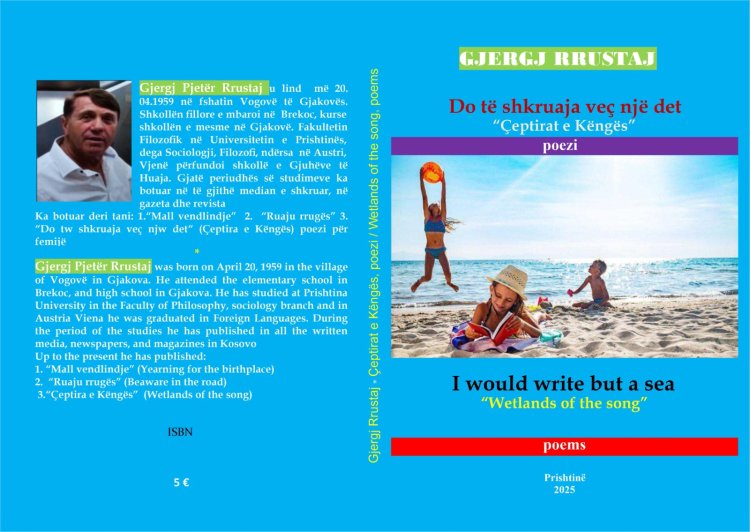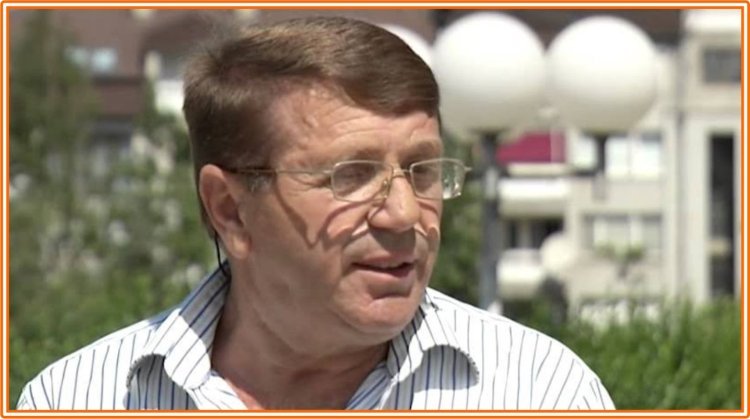GJERGJ RRUSTAJ
“Vjersha ndjenjësore dhe emocionale”
Nga Mr. Sc. But Jaku
Gjergj Rrustaj në vëllimin e vjershave “Çeptirat e Këngës” dëshmon se ka një profesori poeti që mund të hyjë me lehtësi në botën e kënaqësisë shpirtërore dhe ndjenjore të fëmijës. Kënaqësia shpirtërore e fëmijës në këtë vëllim me vjersha, na duket shumë më shumë e nyjëtuar, gërshetuar dhe e lidhur emocionalisht në kuptimin figurativ se në atë simbolik. Personazhet e këtij vëllimi me vjersha për fëmijë janë marrë pa ndonjë huti të madhe, ato i ka gjetur dhe i ka thurur poeti nëpër çeptirat e vendlindjes së vet, ku fëmijët tanë i kanë të njohura bukuritë e tilla të Kosovës, qoftë përmes një shëtitje me shokët, leximit të librave, dëgjimit nga prindërit apo në një mënyrë tjetër; i ndien, sadopak, ato çeptira, lugje, lëndina e tjerë, po, atë çka thotë Rrustaj në këtë vëllim me vjersha, dallon nga poetët e tjerë. Në këtë mënyrë autori përpiqet t’i jap fëmijës një botë sa më të butë, të gëzueshme, që ia gicilon shpirtin ndjenjësor dhe emocional të tij. Kësisoj personazhet e librit “Çeptirat e Këngës” janë krijuar dhe gërshetuar me vetëdijen e qëlluar të poetit, ku aty dallojnë të bukurën dhe të keqen në anën e të bukurës poeti ka paraqitur dhe ka rreshtuar personazhet, të cilët sjellin gëzim e lumturi në jetë, siç është rasti me këngën e zogut, ëndrrat e fëmijës në gjumë, kthimi i dallëndyshes, pranvera, dashuria e nënës e tjera. Ndërsa në anën e të keqes poeti ka vendosur një botë të pakujdesisë prindërore, të shoqërisë, sikundër është rasti, kur babai i blen telefonin të birit e të luajë në orën e mësimit, apo në rastin, kur shoqëria nuk kujdeset për mullirin e vjetër. Fëmija i përditshmërisë sonë, në vjershat e Gjergj Rrustaj, vjen si porosi edukative- arsimore midis të bukurës dhe të keqes me çka arrin ta ruajë kriteriumin e barazpeshës me një ide estetike, ku me anën e secilës formon përmbajtjen e tekstit letrar.

Feelingful and emotional poems
By Mr. Sc. But Jaku
Gjergj Rrustaj in his volume with poems “Çeptirat e Këngës” (Wetlands of the song) testifies that he has mastery in the field of poetry which can enter easily into the world of the spiritual and feelingful satisfaction of the child. The spiritual satisfaction of the child in this volume with poems is very nodulated, intertwined and tied emotionally more in the figurative meaning than the symbolic one. The characters in this volume with poems for children are taken without any great bewilderment; the poet has found and shaped them throughout the wetlands of his birthplace, where our children are familiar with such beauties of Kosovo, through their walks with their friends, hearing from their parents, reading in the books or in other ways; you feel, those wetlands, grooves, greenswards etcetera, but, that what Rrustaj says in this volume, differs from other poets. In this way the author is trying to give the child a soft and happy world, which titillates his feelingful and emotional spirit. In this manner the characters of his book “Çeptirat e Këngës” are created and intertwisted with the happy awareness of the poet, where we distinguish the beauty and the evil on the beauty’s side the poet has presented and aligned the characters, who bring joy and happiness in life, as it is the case of the bird’s song, child’s dreams in his sleep, the swallow’s return, the spring, mother’s love etc. whereas on the side of evil the poet has placed a world of the paternal and social carelessness, as it is the case when the father buys a phone for his child to play during the class, or in the case when the society does not care about the old mill. Our everyday child, in the poems of Gjergj Rrustaj, comes as an educational request amidst the beauty and the evil by the means of which the author manages to retain the criterion of balance with an aesthetical idea, by the means of which he shapes the contents of the literary text.
................................................................
36 SHKRONJA
36 shkronja
e shkruajnë një tregim,
e shkruajnë një blerim,
rrëfejnë një qytet,
rrëfejnë një kala,
rrëfejnë një poet;
36 shkronja janë të mëdhaja,
janë një libër, janë një pyll,
më i lartë se një qiell,
janë një flamur,
shkruajnë një mal,
shkruhen në gur.
SËRISH NË SHKOLLË
Na ikën pushimet,
oh, sa gëzim,
Ditët e pushimit
filluan fluturim.
Zgjohu vëllaçko!
Kah shkolla drejtohemi,
të përmallshëm me shokë,
kur të takohemi.
E para e jap dorën,
ti atëherë shiko…
kur ta përfundoj,
atëherë ti fillo.
................................................................
36 LETTERS
36 letters
write a story
Write about verdure,
narrate about a town
Narrate about a castle,
narrate about a poet;
36 letters are massive,
they are a book,
They are a forest,
higher than a sky,
They are a flag,
they wrote on a mountain,
They are written on a stone.
IN SCHOOL AGAIN
The holidays finished,
oh, what a joy,
The days of holidays
began their flight.
“Wake up bother!
We shall head for school,
Longingly with friends
we shall meet.
I shall give my hand first,
and you watch…
When I finish,
then you start.
Nga libri “Çeptirat e Këngës” (poezi)
From the book “Wetlands of the song” (poems)
Përgatiti Redaksia e ORFEU-t (df)



